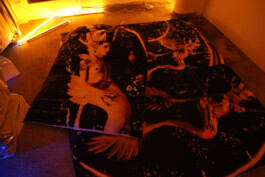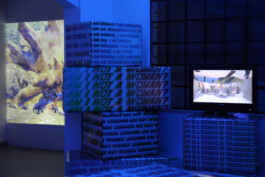




































Everything will end in ruins a study on loss
18 May - 26 June 2024
“Melancholia offers the paradox of an intention to mourn that precedes and anticipates the loss of the object (...) paradoxically figures a certain space of delay as well as an anticipation of a place yet to come. ”
Loss: The Politics of Mourning, Eng, David L. and David Kazanjian
“Utopian performativity is often fueled by the past. Τhe past or at least narratives of the past enable utopian imaginings of another time and place that is not yet here but nonetheless functions as a doing for futurity, a conjuring of both future and past to critique presentness.”
Cruising Utopia: The Then and There of Queer Futurity, José Esteban Muñoz
PART 1 or my mother died / my mother died for me / my mother died for me to become who I am
When I lost my Mother in 2014, I didn’t realize that I had already lost and mourned her. I hadn’t realized that life consists of innumerable not-yet-here losses that do not leave us unaffected but can be used as very transformative tools. I hadn’t realized that loss, melancholia and mourning are interwoven.
Γεννά η απώλεια την επιθυμία;
According to Freud, the Mother is the primary object of desire.
Our mother’s breast is the first partial loss we experience, leading to the loss of our primary love object, the Mother.
Her lack is the birth of our desire.
Thus, our lives begin, continue and end with varied losses intertwined with desires for bodies, identities, ideals and spaces.
Η πρώτη ανεπανόρθωτη απώλεια έχει ως αποτέλεσμα την ανάδυση της επιθυμίας.
PART 2 Or the circle jerk of melancholia
Melancholia follows loss as the future follows the past.
Walter Benjamin describes melancholia “as a continuing relationship with the past”, the ego itself identifying with the former love objecτ and current lost one, accompanying the path of self-destruction.
H μελαγχολία αναγεννά ή διαλύει.
The death drive of the melancholic ego and its constant devotion to loss allows the subject to immerse themselves in their subconscious, which is either severely disturbed or immensely transformed. The past remains alive and scattered in the present.
Mourning is inseparable from melancholia, just as loss is inseparable from ruins.
Is mourning the last stage before catharsis? And then what? What is left?
The answer is ruins.
Ruins of a not-yet-here, chaotic self. Ruins of the mourner's empty world. Ruins of not- yet-here places. Ruins of the past. Ruins of the future.
Muñoz’s queer utopia is described as “an ideality that can be distilled from the past and used to imagine a future”.
Τι μένει πίσω;
Ερείπια μιας ουτοπίας.
If loss is understood by what’s left behind, then ruins materialize the realm of a utopian possibility.
curated by Vassilia Kaga
--
ARTIST LIST
Andreas Angelidakis Klaus Jürgen Schmidt Super G
Eva Papamargariti Spyros Rennt
Artemisia Reppa Antigoni Tsagkaropoulou Charis Vlahos
Performance at the opening
Vasilis Vilaras unplugged poster by Super G
Everything will end in ruins a study on loss
18 May - 26 June 2024
“Melancholia offers the paradox of an intention to mourn that precedes and anticipates the loss of the object (...) paradoxically figures a certain space of delay as well as an anticipation of a place yet to come. ”
Loss: The Politics of Mourning, Eng, David L. and David Kazanjian
“Utopian performativity is often fueled by the past. Τhe past or at least narratives of the past enable utopian imaginings of another time and place that is not yet here but nonetheless functions as a doing for futurity, a conjuring of both future and past to critique presentness.”
Cruising Utopia: The Then and There of Queer Futurity, José Esteban Muñoz
PART 1 or my mother died / my mother died for me / my mother died for me to become who I am
When I lost my Mother in 2014, I didn’t realize that I had already lost and mourned her. I hadn’t realized that life consists of innumerable not-yet-here losses that do not leave us unaffected but can be used as very transformative tools. I hadn’t realized that loss, melancholia and mourning are interwoven.
Γεννά η απώλεια την επιθυμία;
According to Freud, the Mother is the primary object of desire.
Our mother’s breast is the first partial loss we experience, leading to the loss of our primary love object, the Mother.
Her lack is the birth of our desire.
Thus, our lives begin, continue and end with varied losses intertwined with desires for bodies, identities, ideals and spaces.
Η πρώτη ανεπανόρθωτη απώλεια έχει ως αποτέλεσμα την ανάδυση της επιθυμίας.
PART 2 Or the circle jerk of melancholia
Melancholia follows loss as the future follows the past.
Walter Benjamin describes melancholia “as a continuing relationship with the past”, the ego itself identifying with the former love objecτ and current lost one, accompanying the path of self-destruction.
H μελαγχολία αναγεννά ή διαλύει.
The death drive of the melancholic ego and its constant devotion to loss allows the subject to immerse themselves in their subconscious, which is either severely disturbed or immensely transformed. The past remains alive and scattered in the present.
Mourning is inseparable from melancholia, just as loss is inseparable from ruins.
Is mourning the last stage before catharsis? And then what? What is left?
The answer is ruins.
Ruins of a not-yet-here, chaotic self. Ruins of the mourner's empty world. Ruins of not- yet-here places. Ruins of the past. Ruins of the future.
Muñoz’s queer utopia is described as “an ideality that can be distilled from the past and used to imagine a future”.
Τι μένει πίσω;
Ερείπια μιας ουτοπίας.
If loss is understood by what’s left behind, then ruins materialize the realm of a utopian possibility.
curated by Vassilia Kaga
--
ARTIST LIST
Andreas Angelidakis Klaus Jürgen Schmidt Super G
Eva Papamargariti Spyros Rennt
Artemisia Reppa Antigoni Tsagkaropoulou Charis Vlahos
Performance at the opening
Vasilis Vilaras unplugged poster by Super G

















